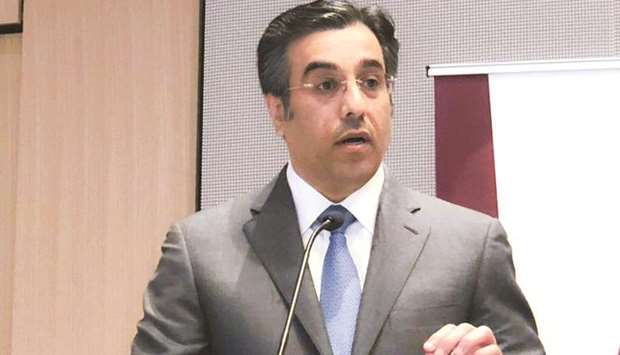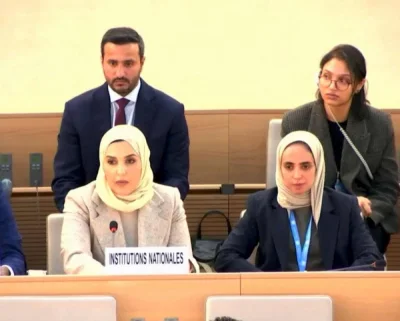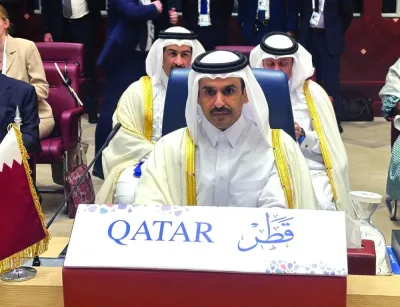HE the Chairman of the National Human Rights Committee (NHRC) Dr Ali bin Smaikh al-Marri has affirmed the committee’s commitment to continue to take the necessary legal measures necessary to condemn the blockading countries because of their violations that have lasted for 1,000 days, stressing that the blockading countries, especially Saudi Arabia and the United Arab Emirates will not be spared of international condemnation by the committee on the Elimination of Racial Discrimination (CERD) and the International Court of Justice (ICJ), and the two bodies will demonstrate the exposure of Qatari citizens to racial discrimination.
HE al-Marri stressed that after three years of unjust blockade, the NHRC will not rest until the victims are compensated, regardless of the fate of the crisis politically.
The statements of HE Dr al-Marri came during his work visit to Washington, where he held a series of meetings with officials at the US State Department that included Deputy Assistant Secretary of State for Near East and International Labour Affairs of the Bureau of Democracy, Human Rights and Labour in the State Department and US Deputy Assistant Secretary for Arabian Gulf Affairs at the Bureau of Near Eastern Affairs in the State Department Timothy Lenderking.
During his meetings with US State Department officials, NHRC chairman affirmed that citizens and residents in Qatar have faced 1,000 days of racial discrimination, noting that one of the most dangerous aspects of the suffering incurred by Gulf citizens is the obstacles imposed by the blockading states – especially Saudi Arabia and the UAE – on the freedom of movement of people, which did not exclude the sick, children and the elderly.
He pointed out that undermining the freedom of movement resulted in dispersion of Gulf families, and forcible separation of many families, on the pretext that one of its members holds the Qatari nationality, as well as a violation of the right of Qataris and residents to practise religious rites, causing denial of Haj and Umrah for three consecutive seasons.
HE Dr al-Marri said in Qatar the people are facing an unjust blockade. It is not an exaggeration to say it is among the worst forms of the blockade that targets people, and has deprived thousands of citizens and residents in the Gulf states of their basic rights, foremost of which is the right to treatment, transportation, education, and family reunification, and other fundamental rights that the blockade states continue to violate, disregarding the calls of states, governments, and international human rights organisations, the most recent of which is ICJ’s decision demanding the United Arab Emirates to stop its discriminatory measures against citizens and residents in Qatar, but the Abu Dhabi authorities continue to violate their obligations to the ICJ.
He added that the blockade of Qatar affected the human rights situation in the region, and led to a loss of confidence in regional human rights mechanisms and conflict resolution.
Meanwhile, HE Dr al-Marri presented an overview of the progress of the cases before the CERD against Saudi Arabia and the United Arab Emirates, and the cases brought before the ICJ against Abu Dhabi, stressing that all cases brought before the CERD and the ICJ will demonstrate to the world that what has been practised against Qataris is racial discrimination. He pointed out that the Gulf community is shocked by these racist practices committed by the United Arab Emirates and Saudi Arabia against citizens and residents of Qatar.
He addressed the officials of the US State Department by saying that every year, the US State Department issues a report that records human rights violations in the world, and NHRC demands that the violations of human rights by blockade countries be included in the next report of the US State Department.
HE Dr al-Marri added that these violations have been confirmed by the United Nations High Commissioner for Human Rights, the European Parliament and many parliaments and human rights organisations in the United States and the world, stressing that it’s necessary to include the violations by the blockade countries in the report of the US State Department on the human rights situation in the world.
He explained that condemning human rights violations should not exclude any region in the world, let alone the Middle East and Gulf region saturated with conflicts and disputes and the consequent grave human rights violations that threaten the security and stability of the region, and therefore, the security and stability of the world as a whole.
In a related context, HE Dr al-Marri affirmed that the committee urges the Qatari government to continue the reforms it is undertaking to protect and defend the rights of citizens and residents of Qatar alike.
During a reception organised in his honour by the US-Qatar Business Council, the NHRC chairman said that protecting the rights of citizens and residents in Qatar is an essential pillar in the work of the NHRC, which has not stopped demanding the Qatari government for further reforms.
On the recent reforms made by the Qatari government to protect the rights of expatriates, he said the International Labour Organisation has welcomed the reforms adopted by Qatar for the benefit of expatriate workers. Many human rights organisations have also encouraged the Qatari government to proceed with the reforms approach. He added that the NHRC, on its part, welcomed the reforms and new legislation, and it continues to urge the government through its various reports and recommendations to continue the approach of reforms without stopping.
Regarding the rights of workers employed in facilities related to the 2022 Qatar World Cup, HE Dr al-Marri said that they have certainly seen the reports of many human rights organisations that value the measures taken by the Qatari authorities to provide a safe working environment for these workers. The NHRC has always called for improving conditions of residence and the work of these workers, because it is firmly convinced that the rights of workers and the reforms that preserve their dignity must be permanent and lasting even after the World Cup ends. After the blockade, the NHRC faced other challenges in its work for Qataris and residents.
He referred to the recent visit by a delegation from the European Parliament and a delegation from the European Union headed by EU special representative for human rights Eamon Gilmore to a number of the World Cup facilities, and his meetings with workers and officials from various stakeholders in the State of Qatar, such as the Ministry of Foreign Affairs, the Ministry of Administrative Development, Labour and Social Affairs, the National Human Rights Committee and the International Labour Organisation, where Eamon Gilmore stressed, at the end of his visit, his appreciation for the efforts made by Qatar to introduce new improvements and legislation to end the sponsorship law to serve the rights of expatriate workers, praising the degree of progress and improvement in the conditions of work and workers in Qatar.
He pointed out that the NHRC co-ordinates with the European Union, the European Parliament, the United Nations and international organisations on all that related to human rights in the State of Qatar, and there is an ongoing discussion between the NHRC and the Qatari government and international bodies.
He also indicated that the NHRC has always welcomed all visits to Doha requested by international organisations. The State of Qatar is one of the few countries that extended an open invitation to the United Nations Special Rapporteurs to visit Qatar. It has repeatedly welcomed all international organisations to visit Doha to learn about the human rights conditions in it, including meeting representatives of the blockade victims and listening to their testimonies about the suffering they have been subjected to for almost three years.
Meanwhile, HE Dr al-Marri presented during his discussions with the attendees an overview of the repercussions of the blockade that has been going on for 1,000 days, warning of the grave consequences resulting from the continued human suffering of thousands of citizens and residents, not only in Qatar, but in all the countries of the Gulf Co-operation Council.
He highlighted the need to raise awareness among the American community and all societies about the seriousness of the punitive measures taken by the blockading countries, stressing that there is no selectivity in the field of human rights and no calculations, and that violations are stateless, and that the issue of victims is the responsibility of the international community without discrimination.
Responding to the inquiries of members of the US-Qatar Business Council regarding the new challenges facing the NHRC as a result of the blockade of Qatar, HE Dr al-Marri said: “The blockade imposed on us new challenges, and the National Committee has received multiple complaints from citizens and residents affected by the grave violations imposed by the blockading countries”, but this did not and will not force it to forget the basic role of the NHRC in defending human rights as a whole, including protecting the rights of Qatari citizens and residents, and the rights of expatriate workers in Qatar.

HE the Chairman of the National Human Rights Committee (NHRC) Dr Ali bin Smaikh al-Marri addressing the officials of the US State Department.


